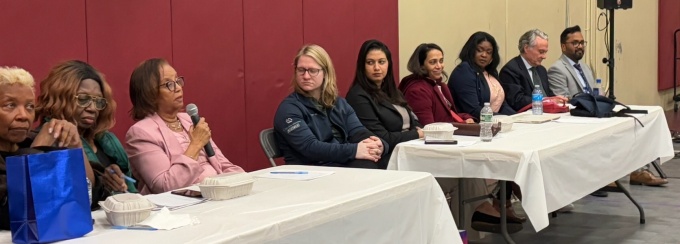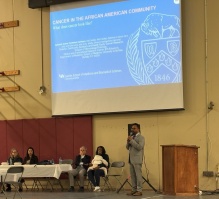NICE Seminar

The Neighborhood Network of Integrated Care (NICE) is a community-oriented academic program that stands out with its unique approach of “bringing education to the community.”
Date: Nov. 23, 2024
Location: Reverend Dr. Bennett W. Smith Sr. Family Life Center, 833 Michigan Ave., Buffalo, N.Y.
St. John Baptist Church & Gethsemane Missionary Baptist Church Health Ministries in association with Neighborhood Network for Integrated Care Establishment (NICE), Division of Hematology/Oncology, Department of Medicine, Jacobs School of Medicine and Biomedical Sciences, University at Buffalo.
NICE directly engages the community by disseminating guidelines and recommendations from the Centers for Disease Control and Prevention, the American Cancer Society and the National Cancer Institute through community seminars, community-based partners and learning materials created by University at Buffalo students about health care screening, including cancer care information.
This joint venture of the Division of Hematology/Oncology and Health Ministry of St. John Baptist Church is expected to connect more local leaders and collaborators in this effort to join hands.
Director of NICE: Satheesh-kumar Poolakkad-Sankaran, DDS, MDS, MSc, MMSc
Community-Based Partners: Health Ministry of St. John Baptist Church: Winford Quick, MD; Gladys Diji, RN; Ms. Joyce (instructor)
Associate Director: Roberto Pili, MD
Administrative Assistant: Cedrick Ball

- interactive community-level role-play on communication barrier
- discussed misconceptions about cancer
- conversations regarding health care access and transportation issues among African Americans
- the importance of cancer nutrition
Recent data from the East Side of Buffalo/west Cheektowaga research revealed an exceptionally high number of cancer cases, raising the possibility that there may be a higher proportion of cancer survivors in the Buffalo city region.
Additional data from the National Cancer Institute suggests that the death rate for African American patients in Erie County is much higher than that of white patients; the difference is especially noticeable among African American men. Moreover, it is critical to acknowledge that 33.3% of these cancer patients in the East Side of Buffalo-western Cheektowaga are economically disadvantaged — living below the poverty line.
Furthermore, the African American community in the East Side of Buffalo, specifically, has been facing numerous socioeconomic difficulties for a number of years. These struggles include issues with segregation, poverty, high unemployment rates, poor living circumstances and underdeveloped local communities. Efforts to screen for certain types of cancer may be the cause of the current rise in cancer rates.
Nonetheless, lifestyle factors like increased alcohol and tobacco use have also been noted in the East Side of Buffalo. Interestingly, malignancies known to be linked to tobacco use— such as those of the mouth, esophagus, lung, kidney and colon — have been known to increase recently. It is worrisome to note that 17% of Buffalo city residents did not have health insurance. In addition, a more significant percentage of people in Buffalo work jobs where they are exposed to elevated levels of hazardous substances. The East Side of Buffalo has restricted access to healthy food.
Consequently, it is very likely that disparities exist and are largely unrecognized in the diagnosis, treatment and documentation of cancer among various East Side of Buffalo regions and that the effects of cancer diagnosis and treatment on family members are seldom recognized or discussed in any context. Much is still unclear about the coping strategies, decision-making procedures, and treatment of cancer-related symptoms used by cancer patients in the East Side of Buffalo. Therefore, it is critical to understand the requirement of incorporating community-driven strategies specifically designed for the benefit of the community to aid and explore this unique trait of cancer patients.
The NICE program is not just a short-term initiative. It is a long-term commitment-driven support system from the local community-based partners. This commitment ensures that the program will continue to provide support and resources to the community over an extended period, demonstrating its dedication to the well-being of the East Side of Buffalo community.
Efforts are made through NICE to establish community-based health care awareness in the East Side of Buffalo that effectively oversees the well-being of African Americans and their families. The community-based program partners include a network of assistance built on the foundation of respect for the community located close to the cancer patients and a commitment to the community over an extended period.
Some of how the community-based partners (CBP) offer assistance to the community include but are not limited to, the following: community collaborations, the provision of educational resources, the linking of educational tools to the community, the empowerment of individuals, the discovery of resources, the comprehension of unmet needs, coping with cancer, shared decision making, the respect and understanding of cultural aspects and the gifting of equipment and resources, etc.
The initial discussion topics focus on policies that effectively engage priority neighborhoods, namely Genesee-Moselle, Schiller Park and West Hertel. To enhance the development of CBP strategies, the initial focus is on improving cancer patients’ access to resources, cultivating trust with patients and their families, and establishing a durable, dependable, and continuous network of community-based collaborations. Forming focus groups and identifying research domains specific to the community becomes the foundation for the community-based cancer program.
Department of Hematology/Oncology
Roberto Pili, MD — identifying health care disparity is an essential and utmost long-term goal in Buffalo, N.Y.
Program Advisers
Winford A. Quick, MD, and Gladys Diji, RN — there are severe unmet needs among cancer patients, especially cancer survivors in the East Side of Buffalo.
“Cancer patients residing in the East Side of Buffalo are unaware of their self-awareness and treatment options.” - Quick
“African American women struggle to set and attain realistic goals, and the entire family must bear the weight of cancer.” - Diji
Additionally, Diji believes that “a healthy self-perception is essential to mental and emotional health. Feeling less confident among African American women with cancer could be a side effect of undergoing physical transformations to the self-esteem.”